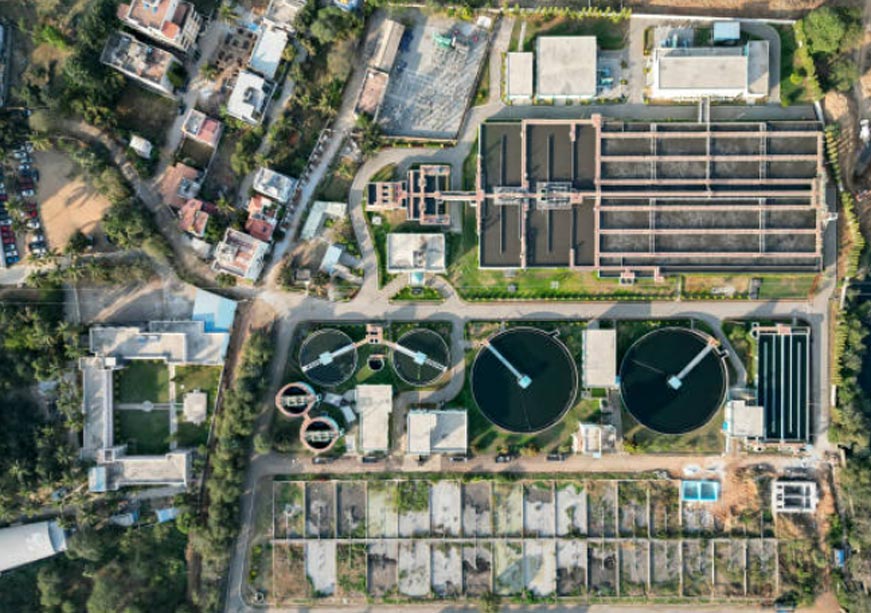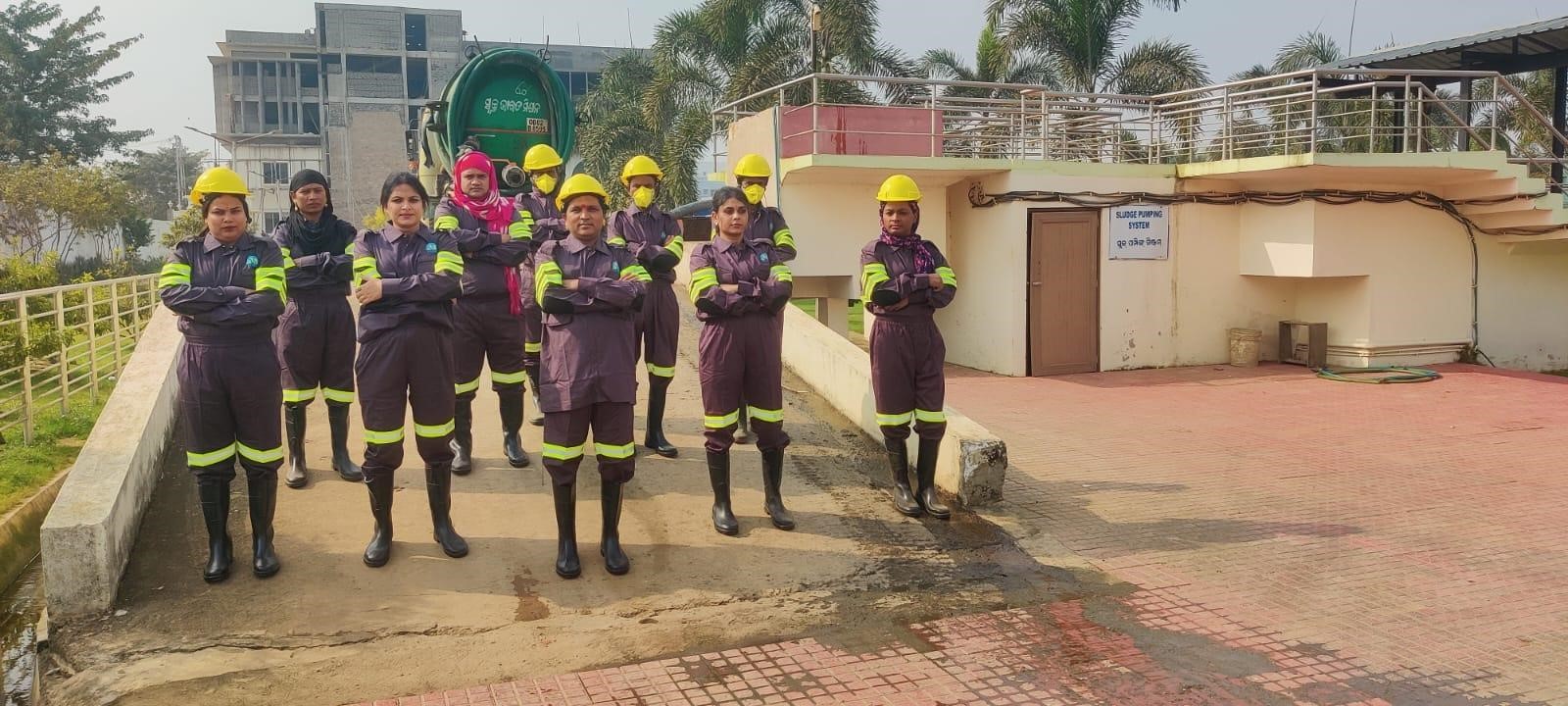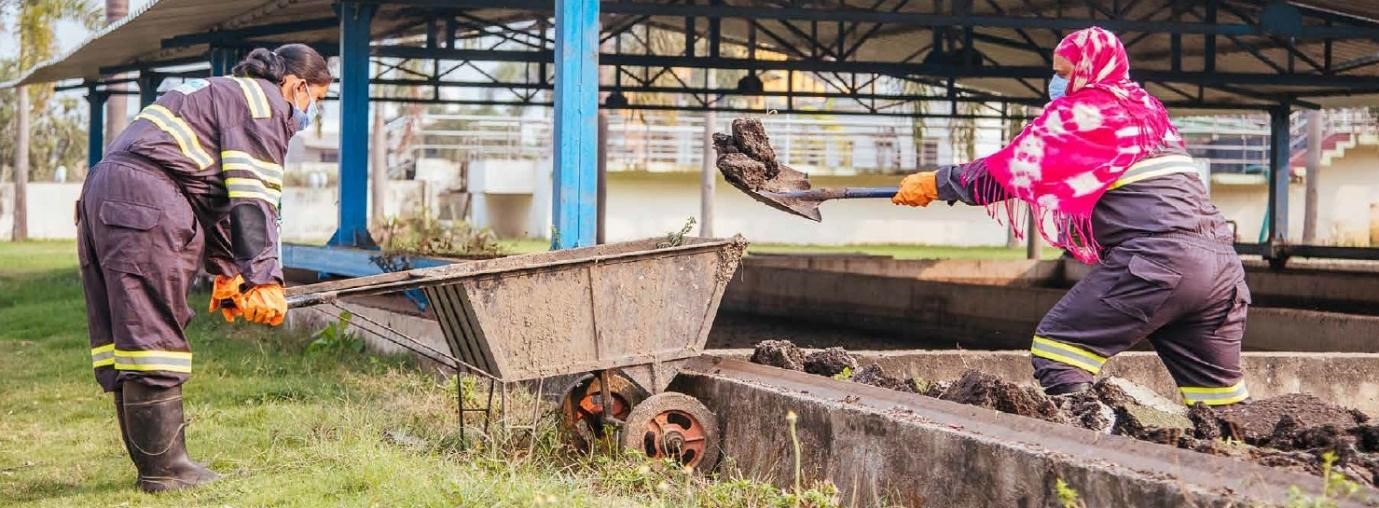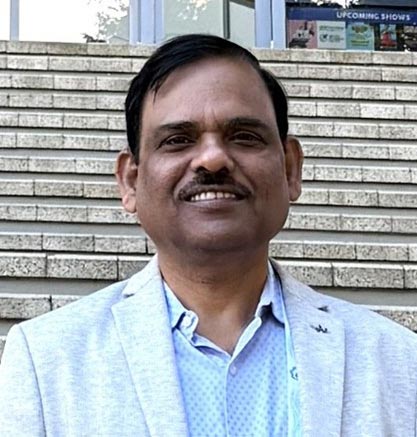-
CENTRES
Progammes & Centres
Location
Odisha’s pioneering Urban Sanitation Policy (2017)demonstrated how a decentralised, inclusive, and resilient sanitation model can transform urban environments.

Image Source: Getty Images
This article is part of the essay series: The World Water Week 2025
Odisha, a coastal state on India’s eastern part, is undergoing rapid urban transformation. As towns expanded, the sanitation and water management challenges have intensified. In 2017, 19 river stretches were classified as critically polluted by the Central Pollution Control Board, largely due to the discharge of untreated faecal sludge and greywater from the state’s 115 Urban Local Bodies (ULBs). Less than 3 percent of the urban population was connected to underground sewer networks. The centralised sewerage systems were deemed impractical for most towns due to high capital costs, topographical constraints, and construction and operational challenges. Odisha’s urban sanitation relied heavily on on-site systems such as pit latrines and septic tanks, with unsafe and unregulated desludging. Faecal sludge was often dumped into open areas and waterbodies, threatening public health. The increasing frequency of cyclones and flooding further aggravated the public health hazards, particularly for marginalised informal settlements. In response, the Government of Odisha adopted a transformative Urban Sanitation Policy in 2017, aligned with Swachh Bharat Mission (Urban) goals through a focus on decentralised Faecal Sludge and Septage Management (FSSM) strategy and inclusive governance. This decentralised and inclusive approach has positioned Odisha as a frontrunner in pollution abatement, community empowerment, and urban resilience in the country.
This decentralised and inclusive approach has positioned Odisha as a frontrunner in pollution abatement, community empowerment, and urban resilience in the country.

Source: Authors’ own

Source: Authors’ own
Odisha’s FSSM model rests on three mutually reinforcing pillars: people-centric governance, nature-based solutions, and resilient livelihoods.
Sanitation services were designed with communities, particularly marginalised groups, as co-creators. Over 1,500 Slum Dwellers Associations (SDAs) and Self-Help Groups (SHGs) were mobilised to monitor services, map infrastructure, and raise awareness. At the core of Odisha’s FSSM journey lies the belief that sanitation systems function best when communities are co-creators and custodians of the solution. The state engaged SHGs comprising women and transgender individuals to run FSTPs in towns like Angul, Balasore, Berhampur, Baripada, Cuttack, Dhenkanal, Rourkela, and Sambalpur. A transgender SHG ‘SWIKRUTI’ took over the operation of an FSTP in Basuaghai, Bhubaneswar. Their involvement deepened the accountability of service delivery and encouraged behavioural change at the grassroots. A pioneering step was entrusting the operation of all 119 Faecal Sludge Treatment Plants (FSTPs) in 115 ULBs to women-led, transgender, and specially abled SHGs. The SHG members were trained in standard operating procedures, plant maintenance, water quality testing, safety protocols, and record keeping.
The people-centric foundation has not just ensured technical success but catalysed social transformation. Women, who once had limited roles in public decision-making, are now plant managers, laboratory technicians, and sanitation advocates. Transgender individuals, previously excluded from formal employment, are now operating vital civic infrastructure. The sanitation system became a tool of empowerment, bridging dignity with delivery. This approach empowered women as plant managers and technicians and created formal employment for transgender individuals. Community ownership improved accountability, strengthened service delivery, and fostered dignity in sanitation work. This inclusive governance advanced constitutional goals such as equality (Article 14), livelihood security (Article 39(a)) and public health (Article 47).
Odisha prioritised low-impact, non-mechanised used water treatment technologies suited to its climate risks. FSTPs use settling tanks, drying beds, anaerobic baffled reactors, planted gravel and sand filters, and polishing ponds in the treatment train. These technologies mimic natural purification cycles without chemical inputs, allowing organic matter to break down through biological action and sedimentation. The facilities generate solar energy through solar panels and are connected to the electricity grid, reducing the carbon footprint of each plant. Odisha’s innovation also extended to piloting the treatment of greywater, the used water from kitchens, baths, and washing areas. The state introduced decentralised nature-based solutions such as constructed wetlands, soak pits, and bio-trenches/swales. Many FSTPs now channel treated output water for road cleaning and irrigation of landscape areas. Piloting of sludge reuse as soil conditioner and organic manure has been successfully carried out with solar greenhouse drying and co-composting with municipal wet waste. This circular loop not only optimises resource use but builds public acceptance of the value of treated byproducts.
Odisha’s FSSM is not just a service but is also an economic opportunity. By integrating vulnerable groups into the operational value chain, the state has demonstrated how sanitation can become a vehicle for both inclusion and livelihood opportunities. The SHGs managing FSTPs earn up to INR 15,000 per month, offering women and transgender persons a consistent, dignified income. Their responsibilities range from opening and closing valves to lab testing, from logbook maintenance to handling citizen interactions. Among the most pioneering aspects of this inclusive economy is the participation of transgender SHGs. Odisha is the first Indian state to onboard transgender collectives and specially abled SHGs into FSTP operations in 12 ULBs. These groups, often excluded from formal employment and dependent on begging or daily wage work, now wear uniforms, operate civic infrastructure, and earn the respect of their communities. To support the entire ecosystem, over 119 women Technical Resource Persons from the SHGs have been trained and deployed across the state. They serve as lab operators, record all activities in a computer, support the digitalisation of the FSSM service, and coordinate between ULBs and SHGs. Private desludging operators were formalised through licensing, digital payments, and service benchmarks.
The Urban Sanitation Policy (2017) was redrafted, and an adaptive, equity-driven framework aiming for Citywide Inclusive Sanitation (CWIS) policy was adopted by the state in 2024 in alignment with SDG 6.2. It acknowledged climate-resiliency, community partnership, and addressed sanitation management comprehensively.
Key features included:
This policy advocates global discourses on climate-resilient infrastructure and inclusive urban development, positioning Odisha as a national leader in decentralised sanitation.
Odisha’s approach has delivered measurable benefits:
Lessons for Replication Odisha’s model offers replicable insights for other regions:
Odisha’s FSSM-driven sanitation transformation demonstrates how a collaborative and inclusive system can improve environmental sustainability, social justice, and economic empowerment. By integrating people, ecology, and livelihoods into its FSSM strategy, the state has created a model that not only addresses immediate public health and environmental concerns but also builds long-term resilience against climate and economic shocks. This shift anchored in decentralisation, inclusivity, and ecological stewardship, offers a blueprint for other states and regions facing similar challenges. In reimagining sanitation as a shared civic responsibility, Odisha provided a platform for empowerment, dignity, and sustainable urban futures aligned with SDG 3 (good health and well-being), SDG 5 (gender equality) and SDG 6 (clean water for all).
Prasanta Kumar Mohapatra is the former Engineer-in-Chief in Odisha Water Supply and Sewerage Board, Housing and Urban Development Department, Government of Odisha and presently, a Senior Expert (Consultant) at CPHEEO, Ministry of Housing and Urban Affairs (MoHUA), Government of India.
Suryabarti Majhi is the Superintending Engineer at Odisha Water Supply and Sewerage Board, Odisha.
Suchisnata Sahoo is a Manager at Urban Habitat, Odisha, Tata Steel Foundation
The views expressed above belong to the author(s). ORF research and analyses now available on Telegram! Click here to access our curated content — blogs, longforms and interviews.

Prasanta Kumar Mohapatra is the former Engineer-in-Chief in Odisha Water Supply and Sewerage Board, Housing and Urban Development Department, Government of Odisha and presently, a ...
Read More +
Suryabarti Majhi is the Superintending Engineer at Odisha Water Supply and Sewerage Board, Odisha. ...
Read More +
Suchisnata Sahoo is a Manager at Urban Habitat, Odisha, Tata Steel Foundation ...
Read More +